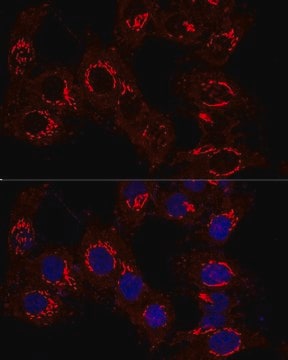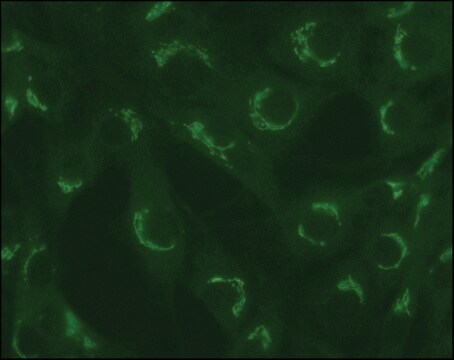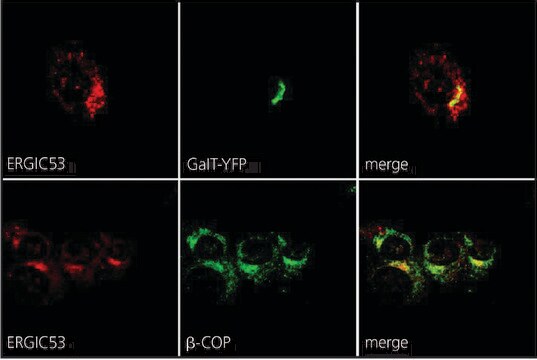G7295
Anti-GM130 (C-terminal) antibody produced in rabbit
affinity isolated antibody, buffered aqueous solution
Synonym(s):
Anti-GM130 (Golgi Matrix Protein of 130 kDa), Anti-Golgi Autoantigen, Anti-Golgi Matrix Protein GM 130
About This Item
Recommended Products
biological source
rabbit
conjugate
unconjugated
antibody form
affinity isolated antibody
antibody product type
primary antibodies
clone
polyclonal
form
buffered aqueous solution
mol wt
antigen ~130 kDa
species reactivity
mouse, human, rat
technique(s)
immunoprecipitation (IP): 2-4 μg using Hela and 3T3 cell extracts.
indirect immunofluorescence: 0.2-0.4 μg/mL using rat NRK cells
western blot (chemiluminescent): 0.1-0.2 μg/mL using whole extract of rat NRK cells
UniProt accession no.
shipped in
dry ice
storage temp.
−20°C
target post-translational modification
unmodified
Gene Information
human ... GOLGA2(2801)
mouse ... Golga2(99412)
rat ... Golga2(64528)
General description
Immunogen
Application
- immunoblotting
- indirect immunofluorescence
- immunoprecipitation
- immunohistochemistry
Immunohistochemistry (1 paper)
Western Blotting (1 paper)
Biochem/physiol Actions
Physical form
Disclaimer
Not finding the right product?
Try our Product Selector Tool.
related product
Storage Class Code
10 - Combustible liquids
WGK
WGK 3
Flash Point(F)
Not applicable
Flash Point(C)
Not applicable
Certificates of Analysis (COA)
Search for Certificates of Analysis (COA) by entering the products Lot/Batch Number. Lot and Batch Numbers can be found on a product’s label following the words ‘Lot’ or ‘Batch’.
Already Own This Product?
Find documentation for the products that you have recently purchased in the Document Library.
Customers Also Viewed
Articles
Centrifugation separates organelles based on size, shape, and density, facilitating subcellular fractionation across various samples.
Centrifugation separates organelles based on size, shape, and density, facilitating subcellular fractionation across various samples.
Centrifugation separates organelles based on size, shape, and density, facilitating subcellular fractionation across various samples.
Centrifugation separates organelles based on size, shape, and density, facilitating subcellular fractionation across various samples.
Our team of scientists has experience in all areas of research including Life Science, Material Science, Chemical Synthesis, Chromatography, Analytical and many others.
Contact Technical Service














